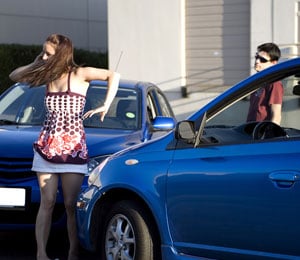 Summer is officially here! Unfortunately, for teen drivers, this is the deadliest time of year.
Summer is officially here! Unfortunately, for teen drivers, this is the deadliest time of year.More teens are now on the road going to their summer jobs, visiting friends, and traveling to summer attractions. This means more cars are driven by inexperienced drivers.
Here are a few reasons why summer is more dangerous for teen drivers:
1. Inexperience. Instead of going back and forth to school, teen drivers are spending more time cruising around. Unfortunately, their lack of experience makes them unable to recognize hazardous situations and underestimate dangerous situations.
2. Increased road congestion. Road congestion increases significantly this time of year. Orange construction barrels litter our roadways. In addition, families are making their annual vacation treks. This extra congestion can lead to erratic driving, road rage, and sudden stops.
3. Distracted driving. Obviously, texting and driving are dangerous. So are loud music and conversations with friends.
4. More likely to engage in risky behaviors. Driving with a car full of friends not only causes drivers to become more easily distracted, they may also feel pressured to participate in risky behaviors.
5. More time is spent driving at night. According to the National Safety Council, vehicle death rates at night are three times higher than during the day. Later curfews make for more cruising time on potentially unfamiliar roads. Adding darkness to the mix could cause them to underestimate a curve or run a stop sign. In addition, darting animals could cause them to swerve out of control. Lastly, they could be sharing the road with drunk drivers or drivers falling asleep at the wheel.
Tips for keeping your teen driver safe
1. Seatbelts save lives. I’m amazed at the number of fatal accidents in the last few months in which occupants weren’t wearing seatbelts. Wearing a seatbelt is a basic concept. According to the CDC, people who wear seatbelts cut their chances of being seriously injured or killed in a crash in half. Every time I hear about an accident in which a fatality occurred because of an ejection, I tell my kids about it and explain how important a seatbelt is.
2. Talk to them about warning lights. Again, as cars become smarter, more systems are being monitored. Go through your owner’s manual and explain to your child what each warning light means. Pay particular attention to tire pressure. Underinflated tires are more dangerous than overinflated ones.
3. Educate your kids on different driving conditions. Did you know you shouldn’t use cruise control in the rain? Do you know what to do if your vehicle hydroplanes? If you don’t know the answers to these questions, how can you expect your kids to know? Cruise control shouldn’t be used in rainy conditions because it could cause your car’s tires to lose contact with the pavement. For detailed information on how to avoid and handle hydroplaning, check out my blog, “Eleven tips to avoid or handle hydroplaning.”
4. Make sure the headlights work properly. Headlights should be properly adjusted for nighttime driving. In addition, the headlight lenses should be clear of debris. If your lens covers are cloudy and it’s difficult for light to pass through, clean them or order new ones.
5. Make sure your teen’s car has good tires. Tires are the most important part of your car. We rely on four tires with a contact patch the size of our hands to keep us traveling down the road safely. So keeping your tires in good shape is important!
6. Limit the number of friends in the car.
7. Establish open communication. If your teen is going to a party that may involve underage drinking, have an honest conversation and share your expectations. While you don’t want to condone underage drinking, you shouldn’t pretend it doesn’t exist. Let them know it’s okay to call you for a ride home. Mixing alcohol and driving can be a deadly combination, especially with inexperienced drivers.
8. Don’t let your teens drive if they’re not in good physical or mental condition. If your teen works a late shift and is too tired to drive, make alternative plans. If your teen is upset over a breakup or a fight with a friend, consider doing the driving.
9. Drive the speed limit. Encourage your teen drivers to drive the speed limit. While speeding could get them to their destinations a few minutes faster, is it really worth the increased risk and the potential speeding ticket? Probably not. How many times has a car passed you and a few minutes later you see it just in front of you at an exit ramp or stop light?
Do you have any tips or information on tires you’d like to share? I’d love to hear them; please share them in the box below.
Source
http://www.autotrader.com/car-news/5-safe-summer-driving-tips-for-your-teen-170002





